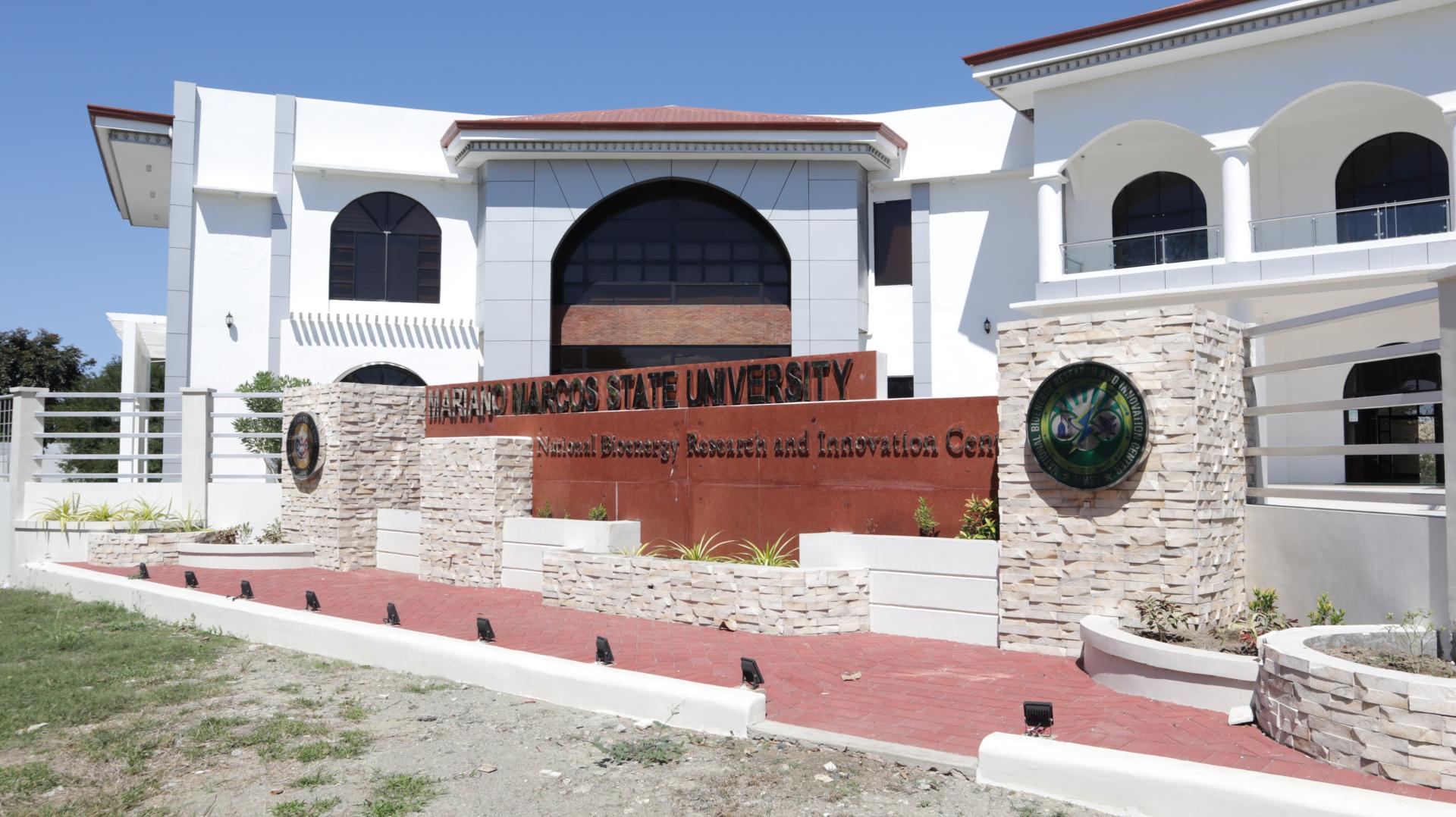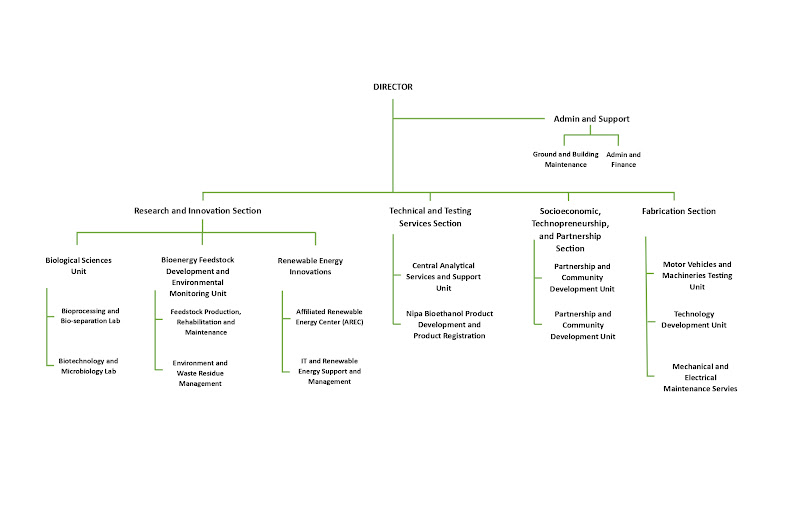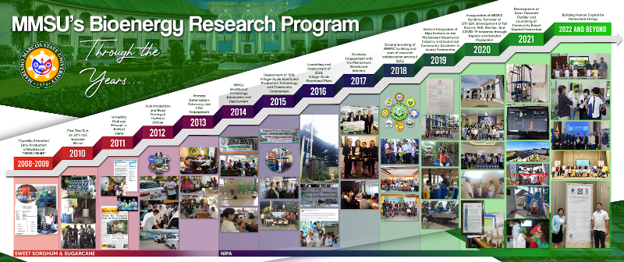National Bioenergy Research and Innovation Center
The National Bioenergy Research and Innovation Center (NBERIC) envisions of becoming a national hub for bioenergy research, training, extension and technopreneurship. To date it has eight partner State University and Colleges (SUC) namely, Aklan State University, Cagayan State University, Central Bicol State University of Agriculture, Central Luzon State University, Marinduque State College, Pangasinan State University, University of Antique and Western Philippines University.
Other partners are the Department of Energy (DOE), Department of Environment and Natural Resources (DENR), Philippine Rice Institute (PhilRice), Department of Science and Technology (DOST), Department of Agriculture (DA), USAID-STRIDE, Ethanol Producers of the Philippines (EPAP), Sugar Regulatory Administration (SRA), World Citi Colleges Aeronautical and Technological College and LGUs.

Goal
Develop a synergy of applied community of interest and community of practice on bioenergy research, development, extension, education & technopreneurship for sustainable development and energy self-sufficiency.
Objectives
- • To develop a national bioenergy research, development and extension agenda, plans and programs for all.
- • To provide a common platform and modality of bioenergy development initiating and enhancing creativity, innovativeness, competitiveness, progress and dynamic partnership.
- • To determine and identify innovative and challenging potentials of bioenergy technologies, services and outputs for production, profit and marketing.
- • To establish, create and capacitate all key players and stakeholders (researchers, educators, development workers, policy makers, and communities) in bioenergy for countryside development through bioenergy research, development, extension, education, training and technopreneurship.
- • To strengthen institutional capacities and competencies of all involved in bioenergy for institutional partnerships and community development.
Research and Extension Projects
2023
- • Establishment of the Affiliated Renewable Energy Center (AREC) in support to the centers' renewable energy projects (DOE)
- • Renewable Energy Executive Competency Training Program (REECTP) for Agriculture and Fishery in Ilocos Norte, Philippines (DOE)
2022
- • Solar Powered Distiller for Bioethanol Production Used as Main Agent for Bio-based Products in Response to COVID-19 Emerging Needs (DOE)
- • Solar Powered Aquatic Life Support System (DOE)
2021
- • Technology Franchising of Village-Scale Nipahol Technology (VSNPT) for Community Empowerment During the Pandemic (USAID-WARP)
2020
- • MMSU SARANAY Against COVID-19: Channeling Ilokano Unity & Productivity Towards Resilliency: "Production of Ethyl Alcohol (70%) using MMSU's Proprietary Fermentation & Distillation Protocols" (CHED)
2019
- • Establishment of Nipa R&D Support Facility, Productivity Assessment of Existing Nipa Stands in Region 1&2 and Coordination of the National Nipa Plantation Project (DENR-NGP)
2018
- • NBRESD
- • Establishment, Restoration, Maintenance and Protection of Nipa Stands for Bioethanol Production (DENR-NGP)
2017
- • Facility and System Improvement thru Development of a Fermentation Equipment, and Steam Heated Reflux Distillation Trials in Support to MMSU Biofuel Research and Production (SRA)
2016
- • Establishment of Community-based Industry R&D on the Feasibility of Hydrous Bioethanol as Biofuel Blend (DOE)
2014
- • Pilot Deployment and R&D of a Multi-Feedstock Village-Scale Modularized Kits for Bio-ethanol Production (USAID)
- • Adaptation and Deployment of MMSU Fermentation and Distillation Technologies for Hydrous Ethanol Production using Nipa Sap (PhilRice)
2012
- • Field Testing of the Production and Use of Hydrous Ethanol as Biofuel (DOST)
- • Village-Scale Production of MMSU Hydrous Ethanol as Feedstock for R&D in Biofuel Trials and Anhydrous Ethanol Production (DOE)
Organizational Structure

The center is a research unit under the Office of the President of the Mariano Marcos State University System. It is also under the Office of the Vice President for Research, Extension, and Business. It has a chief who serve as overall managers and have the responsibility of setting direction, planning, implementing, and monitoring the programs and activities of the center. Under the Chief, there are three sections namely:
-
•
Research and Innovation Section
comprises four (4) units that will focus on bioenergy, renewable research studies, feedstock sustainability, environment and residue utilization researches, technology innovations, and product development. It will house state of the art laboratories to ensure the continuous generation and development of research outputs and technologies.
-
•
Technical and Testing Services Section
it will serve as the main central analytical, testing, and technical support and services division which houses state of the art laboratories for analytical services, motor vehicle and machineries testing, and others.
-
•
Socioeconomic, Technopreneurship, and Partnership Section
responsible for the social, and economic section and industry and community engagement section which will serve as the avenue for all social, economics, techno-business related studies and support services. Also, serve as support and liaison for the local, national, and international linkages and partnerships, and possible funding agencies. Lastly, responsible for the coordination and engagement with local and foreign research and extension collaborators, industry and community partners and stakeholders.
-
•
Fabrication Section
this division is tasked with the comprehensive design, development, and manufacturing of distillation and various renewable energy facilities for the center. Additionally, it assumes the responsibility for the installation, maintenance, repair, and optimization of all center facilities and equipment, including the deployment of distillation facilities to our partner communities and SUCs. Furthermore, the Fabrication section will offer mechanical and electrical services, assessments, and maintenance for both the NBERIC building and its vehicles.
Milestones Highlights

2008-2009
- • "Guerrilla Scientists" Early Production of Bioethanol "MMSU 95hBE"
2010
- • First Trial Run on 20% hBE Gasoline Blend
2011
- • Unveiling Hydrous Ethanol as biofuel Blend
2012
- • Bulk Production and Road Testing of Hydrous Biofuel
2013
- • Process Optimization, Advocacy and LGU Engagement
2014
- • MMSU Bioethanol Technology Adaptation and Deployment
2015
- • Deployment of 150L Village-Scale Bioethanol Production Technology and Community Engagement
2016
- • Launching and Deployment of 850L Village-Scale Bioethanol Plant
2017
- • Business Engagement with the Mainstream Bioethanol Industry
2018
- • Groundbreaking of NBERIC building and start of research collaboration among 8 SUCs
2019
- • Vertical Integration of Nipa Farmers to the Mainstream Bioethanol Industry and Sustained Community-Academe-Industry Partnership
2020
- • Inauguration of NBERIC Building, Turnover of DTI-SSF, Development of Full Electric 150L Distiller, and COVID-19 response through Nipahol and Ilokoho Production
2021
- • Development of Solar Powered Distiller and Launching of Community Based Nipahol Production
2022 and Beyond
- • Building Human Capital for Renewable Energy
Laboratories
Materials Handling & Machine Laboratory
Materials Handling laboratory houses equipment for handling various biomass for extensive research purposes and industrial applications. The Machine laboratory functions to be the main fabrication area for machinery and metal works for the prototyping and machine fabrication of various research.
Techno Demo Laboratory
The Techno Demo Lab is designed to represent the innovation of the project from a zero-funded project to all renewable energy bioethanol distiller. It serves as a show room for students and professionals encouraging innovative ideas and promote technology that works for the people.
Bioprocessing Laboratory (Biomass Characterization Laboratory)
Research avenue for biomass research and bioconversion which mainly focuses on the biodegradation, saccharification, and fermentation of waste biomass such as, agricultural biomass, forest biomass, market waste, and other bioenergy feedstocks. The lab comprises two sections, the biomass preparation and the dry and wet sections. The biomass preparation section will be the venue for the physical pre-treatment for the raw materials for bioprocessing which includes, milling, shredding, drying, and sieving of the materials. The biomass dry and wet section serve as the venue for chemical and biological pre-treatment of the biomass raw materials. Biodegradation and Saccharification processes will be done in this laboratory.
Bioprocessing & Industrial Value-added Products (Analytical Laboratory)
The Bioprocessing and Industrial Value-added Products Laboratory is a state-of-the-art research venue that houses analytical facilities, bioprocessing and renewable energy technology. The main goal is to contribute towards energy security, climate change mitigation, and sustainability by developing innovative technologies to produce value-added products from agricultural inputs.
Bioseparation Laboratory
The Bioseparation Lab provides an interdisciplinary environment for conducting cutting-edge and transformative research studies in bioprocessing. The main goal of this laboratory is to develop novel and cost-effective strategies for extraction and purification of biological molecules, cells produced by industrially important microorganisms. It is also an avenue for developing cost-effective processes for recovery of industrial and biologically important products derived from a variety of native and possible transgenic sources.
Biotechnology Laboratory
Focuses on the R&D of new strains of microorganisms from various sources potential for biotech and industrial applications. It is also an avenue for developing and improving microorganism for higher yield of bioethanol, production of bio-based products and development of waste management technology. The said laboratory is divided into two sections, Microbiology and Molecular Biology Sections.
Tissue Culture Laboratory
Tissue Culture Laboratory focuses on micropropagation and in vitro conservation of Nipa to ensure sustainability of this major bioenergy feedstock.
Small Laboratory
The Small Laboratory houses essential equipment for molecular biology experiments and data analyses. This facility can be used for nucleic acid extraction, PCR analysis, electrophoresis, and visualization of electrophoretogram.
Electrical, Electronics & IT Laboratory
The laboratory specializes in research-based areas of electrical Engineering, Signal Processing, Control Engineering, Power Electronics, Energy measurement, Data Analytics, Server Development, Web application Development, and i4.0 development.
Administration (As of December 31, 2023)
Program Leader
Director
Section Chiefs
- Engr. Loreli Faye T. Manzano - Technical and Testing Services Section
- Prof. Marjorie P. Garcia - Socioeconomic, Technopreneurship, and Partnership Section
- Engr. Nathaniel Ericson R. Mateo - Fabrication Section
- Engr. Thomas D. Ubiña - Research and Innovation Section
Faculty Researchers - Active
- Dr. Shirley C. Agrupis, Ph.D. (Agricultural Sciences/Bioprocessing/Bioconversion)
- Dr. Bjorn S. Santos, Ph.D. (Agricultural Engineering/Biofuel Development)
- Alvin G. Domingo, M.Sci (Biology)
- James Paul T. Madigal, M.Sci. (Molecular Biology and Biotechnology/Microbiology)
- Joselito Rosario, Ph.D (Forestry)
- Marjorie P. Garcia, BSEcon, MSRD (Economics)
- Marlyn Cacatian, M.Sci. (Social Science)
- Marilou P. Lucas, Ph.D. (Agricultural Economics)
- Nathaniel Ericson R. Mateo, PME, MSc Mgt. Engg (Mechanical Engineering)
- Thomas D. Ubiña, MAEd (Electrical Engineering)
- Vladimir P. Ibañez, MS-CPE (Computer Engineering)
- Willen Mark D. Manzanas, MS-CPE (Computer Engineering)
Faculty Researchers - Retired
- Estrelita Domingo, MS (Environmental Science/Toxicology)
- Romaric Ascaño, MEP (Mechanical Engineering)
- Roseller Ayson, Ph.D. (Forestry)
- Roque A. Ulep, Ph.D. (Chemical Engineering/Chemistry)
Full-time Researchers
- Bonne Jovi Orteza, (Forestry)
- Christopher Baga, (Mechanical Engineering)
- Jayson F. Cariaga, (Biology)
- Julius Jonar Butay, (Agricultural and Biosystems Engineering)
- Loreli Faye T. Manzano, (Chemical Engineering/Chemical Technology)
- Psalm David Pastor, (Electrical Engineering)
- Raymart Villena, (Computer Engineering) - on Study Leave
- Thiara Celine Suarez, (Biology) - on Study Leave
Support Personnel - Research
- John Rein Corpuz, (Electrical Engineering)
- Kristel Lyn Saldivar, (Economics)
- Laurenz Aglipay, (Chemical Technician)
- Rolando Rodrigo, (Forestry)
Support Personnel - Non-Research
- Glen Lubiano, (Automotive Technology)
- Janina Alpha Morales, (Financial Management)
- Lord Hendritgh Casil, (Sociology)
- Mary Ann Rafal, (Facility Services)
- Ruben Nalundasan, (Mechanical Services)
- Venchzer Derick Dauz, (Mechanical Services)
Contact Information
National Bioenergy Research and Innovation Center
Mariano Marcos State University
16S Quiling Sur, City of Batac 2906
Ilocos Norte, Philippines
Telephone: (63) (077) 774 0013
Email: nberic@mmsu.edu.ph
Facebook: https://www.facebook.com/NBERIC.MMSU
NBERIC in the Media
2023
- MMSU-NBERIC in the Bioethanol Industry / January 1, 2023 / Bannawag
- Balik Scientist invents Nipahol as alternative fuel to LPG / January 8, 2023 / Business Mirror
- U.S. Grains Council, Mariano Marcos State University partner to promote biofuels in PHL / January 10, 2023 / Daily Guardian
- US to assist PH on ethanol, ASF / January 10, 2023 / Malaya Business Insight
- MMSU pushing 'nipahol' as fuel blend / January 14, 2023 / The Manila Times
- Council Lays Groundwork with MOU Partner for 2023 Ethanol Promotion in the Philippines / January 17, 2023 / U.S. Grains Council
- Distilled sap from nipa palm proposed as fuel blend / February 23, 2023 / Malaya Business Insight
- For a climate-smart Ilocos Norte / February 25, 2023 / The Manila Times
- MMSU President Receives PH Resilience Award / October 14, 2023 / The Post
- MMSU-Nberic reviews biomass research proposals / October 26, 2023 / The Manila Times
2022
- MMSU in Ilocos Norte initiated an effort to expand ethanol production, with support from a USAID research grant / January 27, 2022 / USAID
- Launching of 150 Liters Capacity Village Scale Nipahol Technology (VSNPT) / March 15, 2022 / Aparri LGU
- U.S. Grains Council, Mariano Marcos State University Partner to Promote Biofuels in the Philippines / July 20, 2022 / US EMBASSY
- USGC signs ethanol MOU in Philippines during ATM / August 11, 2022 / Ethanol Producer Magazine
- Ilocos, Bicol universities boost biofuel R&D / August 13, 2022 / The Manila Times
- Balik-scientist program props up MMSU nipa tech / October 6, 2022 / The Manila Times
- DOST Balik Scientist Discovers Alternative Cooking Fuel to Replace LPG Stoves in Homes / December 28, 2022 / DOST
2021
- Usaid Awards Php12 Million In Grants To Philippine Universities For Research And Innovation / April 27, 2021 / USAID
- MMSU, Laoag City gov't to put up nipa plantation / April 3, 2021 / Ilocos Times
- Mornings with GMA Regional TV: 'Nipahol' / May 6, 2021 / GMA Regional TV
- PROJECT NIPAHOL | Isinusulong ng Aparri LGU at MMSU / November 5, 2021 / UNTV
- Aparri Community Training 1 / December 10, 2021 / Aparri LGU
- Aparri Community Training 2 / December 19, 2021 / Aparri LGU
2020
- Operation of first bioethanol research center in PH starts / February 27, 2020 / Ilocos Times
- DTI-SSF Project produces Liters of 70% Ethyl Alcohol / April 1, 2020 / DTI
- Ilocos Norte SUC helps produce alcohol vs. coronavirus / March 18, 2020 / Philippine News Agency
2019
- Bioethanol Project of MMSU Inspired Students To Research / January 17, 2019 / DOST R1
2018
- Bioenergy innovation centre approved at Philippines university / July 24, 2018 / Bioenergy Insight
2017
- Nipa farmers benefit from bioethanol production facility / September 5, 2017 / Philippine News Agency
- Renewable energy hub up in Ilocos Norte / October 21, 2017 / Manila Times
2016
- Not just roofing for huts, nipa big source of fuel / August 17, 2016 / Inquirer.Net
- Not just roofing for huts, nipa big source of biofuel too / October 10, 2016 / Ilocos Times
